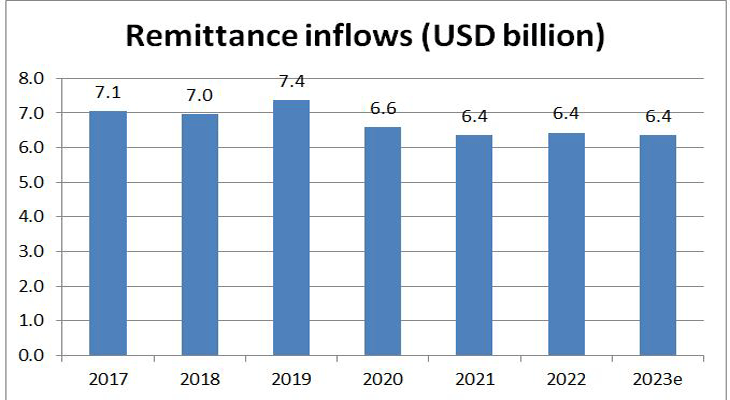Remittances are stable
for third consecutive year
Estimated at $6.4 billion, remain vital for the medium term
| Share |
|

|
|

|
|
|
|
Remittance inflows are estimated to have edged down by one percent in 2023 to $6.4 billion, according to World Bank data.
The weakness in 2023 remittance inflows is tied in part to the slowdown in outward remittances from Saudi Arabia and the United Arab Emirates and to a weak economic growth in the euro area, the World Bank said in its Migration and Development Brief.
Remittances sent by Lebanese expatriates from Saudi Arabia account for the largest chunk of remittance inflows (17 percent), according to 2021 figures. Remittances from the entire Gulf region represent 26 percent of the total. Besides Saudi Arabia, the other major sources of remittances are the United States (16 percent), Australia (11 percent), Canada (11 percent), and Germany (ten percent).

Source: World Bank-KNOMAD
“The prospects for remittances in 2024 will be affected by the difficult situations facing the region’s oil-importing countries, such as Egypt, Jordan, Lebanon, Morocco, and Tunisia. Uncertain regional prospects in the wake of the conflict in the Middle East may lead to increases in their fiscal and current account deficits and could impair political stability. Particularly in Egypt and Lebanon, the twin deficits have heightened pressure on the currencies and foreign currency reserves. The already dire conditions of Lebanese and Syrian economies are likely to deteriorate further,” the World Bank said.
Remittances remain vital into the near and medium terms owing to the chronic fiscal and current account deficits, especially that they account for more than 80 percent of total inflows comprising remittances, foreign direct investment, and official development assistance, which reflects the importance of the diaspora for the economy, according to the report. They represented around 28 percent of GDP in 2023 compared to nearly 15 percent in 2017 mainly due to the sharp decline in GDP in recent years. “Lebanon remains the most vulnerable economy in the region as the country is facing debt restructuring, hyperinflation without reforms, and a sharp devaluation of its currency,” the World Bank said.
Date Posted: Jan 05, 2024
| Share |
|

|
|

|
|
|
|